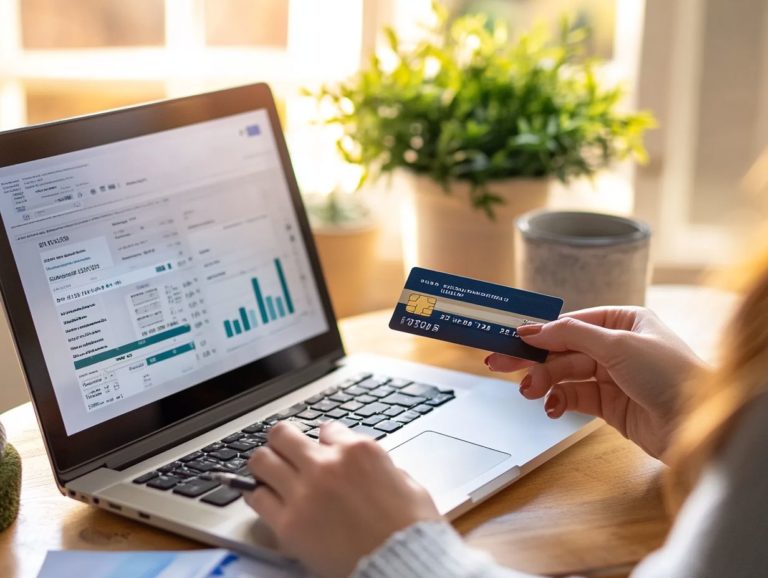How to Build Credit with a Credit Card?
Understanding credit scores and reports is crucial for anyone aiming for financial stability. Your credit score impacts everything from loan approvals to interest rates, making it vital for you to know what it entails and how to access your credit report.
This article delves into the role of credit cards in building credit and guides you in selecting the right card while offering tips for responsible usage. It also highlights common mistakes to avoid as you work towards a healthier credit profile.
Jump in now and take charge of your financial future!
Contents
- Key Takeaways:
- Understanding Credit Scores and Reports
- Building Credit with a Credit Card
- Tips for Building Credit
- Common Mistakes to Avoid
- Frequently Asked Questions
- 1. How can I use a credit card to build credit?
- 2. Is it necessary to have a high credit limit to build credit?
- 3. How long does it take to build credit with a credit card?
- 4. Do I need to carry a balance on my credit card to build credit?
- 5. Can a secured credit card help me build credit?
- 6. Are there any risks to building credit with a credit card?
Key Takeaways:

- Know your credit score it s your key to building credit successfully! Regularly check your credit report for accuracy and identify areas for improvement.
- Pick the right credit card that fits your financial goals. Use it responsibly by making timely payments and keeping your balance low.
- Building credit takes time and effort. Consider options like becoming an authorized user or taking out a secured loan to improve your credit score. Avoid common mistakes like overspending and missing payments.
Understanding Credit Scores and Reports
Understanding credit scores and reports is crucial for anyone looking to build credit or secure loans. These documents provide a detailed snapshot of your financial health, showcasing your payment history, how much credit you use compared to your limit, and account activity.
Credit scores typically range from 300 to 850, with higher scores indicating better credit reliability. Organizations like FICO and VantageScore evaluate credit reliability by considering various factors, including late payments and how you manage your credit limits.
Lenders rely on this information to make informed decisions regarding loan approvals and rental applications, making it essential for you to understand these scores.
What is a Credit Score?
A credit score is your financial report card. It reflects your credit reliability through a numerical value. This score is typically calculated using models like FICO and VantageScore, which assess key factors such as your payment history, how much credit you use, and the variety of credit accounts you hold.
These scores range from poor to excellent and play a vital role for lenders evaluating your applications for loans and credit cards. Generally, if your score is above 700, you re in good standing, while anything below 600 might significantly limit your options. Different scoring models can yield varying results, so understanding which model is being applied is crucial.
By maintaining a positive credit score, you pave the way for favorable loan approvals and increase your chances of securing credit cards with better terms and lower interest rates. This can profoundly impact your financial health.
How to Access Your Credit Report
Accessing your credit report is essential for monitoring your financial well-being. You can do so for free once a year through sites like AnnualCreditReport.com. This valuable resource compiles information from major credit bureaus like Experian, TransUnion, and Equifax.
Understanding your credit information is crucial; it enables you to spot discrepancies or unauthorized charges that could signal identity theft. Regularly reviewing your report allows you to catch errors early, which can significantly affect your credit scores and ultimately your financial decisions.
Regularly checking your reports helps you make informed choices regarding loans, credit applications, and investments. Habitually accessing this credit information nurtures a sense of financial responsibility, enabling you to craft better budgeting plans and proactively maintain and enhance your credit profile over time.
Building Credit with a Credit Card

Building credit with a credit card is one of the most effective strategies for enhancing your credit score. When used responsibly, it helps establish a positive payment history, lowers the amount of credit you’re using compared to your total credit limit, and significantly boosts your overall credit health, especially if you know how to rebuild credit with a business card.
You can choose between secured cards, which require a deposit and are often easier to obtain for beginners, unsecured cards, or student cards as you embark on your credit-building journey. To ensure you make the most of these options, learn how to use a credit card responsibly. You can also become an authorized user on someone else’s account to further maximize your credit opportunities.
Choosing the Right Credit Card
Choosing the right credit card can profoundly influence your credit-building journey. For those starting out, learning how to use secured credit cards to build credit can be especially beneficial. You’ll find a range of options, from secured cards perfect for newcomers to specialized student cards crafted for young adults, each boasting unique features like low interest rates and enticing rewards.
Understanding various factors interest rates, annual fees, and rewards programs is essential for making an informed decision. For example, a Capital One card might catch your eye with its attractive cash back benefits, ideal if you frequently spend in specific categories.
The Discover it Secured Credit Card stands out as an exceptional choice for those aiming to rebuild their credit, offering no annual fee and opportunities to earn cash back on purchases.
By thoughtfully evaluating these features in light of your personal financial goals whether that s minimizing debt or maximizing rewards you can select a card that meets your immediate needs and enhances your long-term credit health.
Using Your Credit Card Responsibly
Using your credit card responsibly is essential for building a strong credit history. This means making timely payments, steering clear of late payments, and maintaining a low amount of credit you’re using compared to your total credit limit. For more insights, check out this guide on how to rebuild your credit with a credit card to gradually enhance your credit score.
To meet these goals, consider implementing best practices such as setting up automatic payments for at least the minimum amount due. This helps you avoid missed payments and cultivates a routine for managing your finances. Additionally, utilizing payment reminders can act as a safety net against occasional lapses in memory.
It’s crucial to establish a clear strategy for handling credit card debt, whether it’s the snowball method or the avalanche approach. These strategies can help reduce your outstanding balances and improve your overall credit utilization.
Following these practices makes it easier to build a strong credit history, which is vital for securing future credit opportunities.
Tips for Building Credit
Building your credit is a gradual journey that requires a thoughtful approach. You’ll want to employ a variety of strategies to enhance your credit health, including consistent credit monitoring, leveraging credit builder loans, and using credit card applications to build credit while ensuring a positive payment history.
Staying diligent helps you avoid common pitfalls like credit card debt and late payments, setting you on a path to financial strength.
Other Ways to Improve Your Credit Score

Along with using credit cards, you have various options at your disposal to enhance your credit score. Consider leveraging tools like Experian Boost to report on-time rental payments and strategies for building credit history that can significantly improve your credit health.
Another effective strategy is to manage your existing credit accounts wisely by ensuring your bills are paid punctually. This habit showcases your reliability to lenders and reinforces your creditworthiness.
Engaging with credit monitoring services can provide valuable insights into your credit report, alerting you to any changes or inaccuracies that may require your attention. Additionally, reporting non-traditional payments, such as utility and phone bills, can further enhance your credit profile.
When combined, these strategies create a well-rounded approach to credit enhancement, paving the way for a more promising financial future.
Start building your credit today for a brighter financial future!
Common Mistakes to Avoid
Steering clear of common missteps is crucial for preserving a healthy credit score. Errors like accumulating credit card debt, making late payments, and succumbing to unauthorized spending can profoundly affect your credit health and future financial opportunities.
Be vigilant and proactive to safeguard your financial standing and pave the way for a more secure financial future.
Credit Card Pitfalls to Watch Out For
Credit card pitfalls aren’t just about the risk of building debt; they also encompass the potential fallout from high interest rates, late payments, and inadequate security features that could leave you vulnerable to credit card fraud, which is when someone uses your card without permission.
Understanding these dangers is essential for preserving your financial well-being. High-interest debt can quickly spiral out of control, leading to monthly payments that stretch your budget to its limits. Late payments result in pesky fees and can tarnish your credit score, making future borrowing significantly more expensive.
It s vital to acknowledge the importance of robust security features; without them, unauthorized transactions could slip under the radar until considerable damage is done.
Take charge! Set up automatic payments or keep a close eye on your spending to stay in control.
Frequently Asked Questions
1. How can I use a credit card to build credit?

To build credit with a credit card, use it responsibly by making timely payments, keeping your balances low, and following tips for building credit while avoiding opening too many new accounts at once.
2. Is it necessary to have a high credit limit to build credit?
You don t need a high credit limit to build your credit. Keep your balances low to maintain a good credit score.
3. How long does it take to build credit with a credit card?
You’ll need at least six months to a year of responsible credit card use to establish a good credit history. If you’re looking for tips, check out how to get approved for a credit card. However, it may take longer to see a significant increase in your credit score.
4. Do I need to carry a balance on my credit card to build credit?
No, carrying a balance on your credit card does not help build credit. Paying off your balance in full each month shows responsible credit behavior and can positively impact your credit score. For more insights, check out this guide on how to use credit cards wisely.
5. Can a secured credit card help me build credit?
Yes, a secured credit card requires a cash deposit as collateral, making it easier for individuals with no credit history or poor credit to get approved and start building credit.
6. Are there any risks to building credit with a credit card?
If used responsibly, there are minimal risks. However, it s important to make timely payments and avoid overspending to prevent accumulating debt and damaging your credit score.
Are you ready to take control of your credit? Don t wait to start building your credit every responsible action counts!






